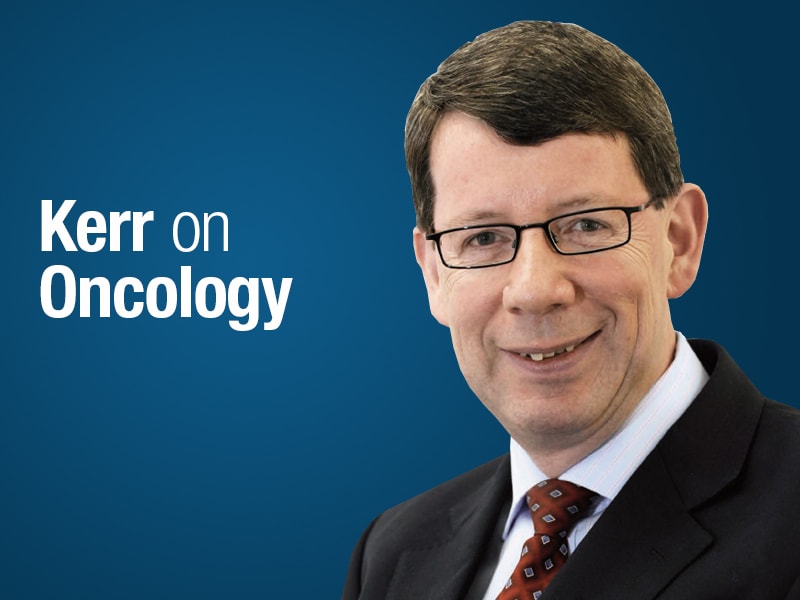Hello. I’m David Kerr, professor of cancer medicine, from University of Oxford. I’d like to talk today about a nice editorial in Lancet Oncology written by Grimes and O’Riordan from Trinity in Dublin, entitled, “Quackery: Starving Cancer and Other Dangerous Dietary Misconceptions.”
I’ll address what these misconceptions are, but perhaps also think about whether there should be a rallying call for us cancer physicians and cancer health professionals, to get more in the forefront about doing something to push these rather scientifically illiterate concepts away. Rather than just shrugging our shoulders, perhaps we should be thinking more about it.
What misinformation is out there? I don’t have social media. I’m not on TikTok or any of those bits and bobs at all. These authors say that, for example, the idea that you can starve a cancer with therapeutic gain can appear on TikTok, where people talk about alkaline diets or a glucose/carbohydrate-depleted diet and get 2 billion views. I’m sure that my likable video just now will have about 23.5 views. We need to find a way to get us, the moderately sane mainstream, out there into the billions of views rather than the tens of views.
The most obvious misconception is the Warburg effect. We know that Otto Warburg demonstrated that tumors depend more on aerobic glycolysis for metabolism of glucose, with lactic acid being a side consequence of this. More on this later when we discuss alkaline diets. Most normal cells generate ATP by the citric acid cycle and mitochondrial respiration. We know that aerobic glycolysis is an inefficient way to generate ATP, the cells’ source of energy. Otto Warburg promulgated or proposed that the so-called Warburg effect was the driver or initiator of cancer.
We know now that it’s a downstream consequence. This hasn’t stopped thousands of cancer cookbooks out there that are focused on how you can actually starve the cancer by avoiding carbohydrates. It’s complete and utter nonsense. Of course it is; all cells use glucose. There’s no particular affinity that tumor cells have for carbohydrates. They don’t gravitate towards it, like the gravitational pull of the Earth. It’s just nonsense. Within that, people are proposing ketogenic diets and all sorts of things. It’s thought that they’re out to make a fast buck, by and large.
Other areas include microenvironmental acidity and alkaline diets. We know that, because tumor cells have a propensity toward metabolizing glucose, they produce more lactic acid; therefore, in the tumor microenvironment, it will be more acidic. Again, this led to the proposal that an alkaline diet would reverse the acidity associated with cancer and have some effect on the rate of growth or the metastatic potential of the cancer. Again, complete and utter nonsense.
My interest in diet goes way back to the ’80s when I was a wee, tiny cancer doctor. There’s a patient I’ll never forget. Something in vogue when I was a kid was the Bristol diet in the UK, which was eating carrots. That’s all people seemed to do. There was hypercarotenemia that was induced. Some people went orange because they were taking so much in the way of carrots. That was supposed to have some effect against cancer, but that was complete nonsense.
We had a patient who’d been through our phase I clinic, and she was dying. All she wanted was to take her family out, close to the end of life, for a curry. What a simple thing, but it was important to her. She wouldn’t do it because she felt guilty about breaking her carrots-only diet. Therefore, she denied herself that small but special pleasure because of the guilt associated. If she were to have had one night off from the carrots to eat a curry, then that would blow up the whole diet. Therefore, she would be guilty of betraying herself and her family by not sticking to this utterly nonsensical, bogus diet.
It does seem as if we might be getting on the front foot. There’s some evidence that suggests, for example, that the Irish Nutrition and Dietetic Institute, according to the article, made an official complaint against the advertising of a ketogenic diet for patients with cancer, citing serious concerns about already vulnerable cancer patients buying the book and commencing the diet at home unsupervised.
Perhaps we need to do more of that. I tend to take a laissez-faire approach. People come in with homeopathic medicines and weird diets. I say, if it empowers you, if it doesn’t cost an arm and a leg, if you’re not being cheated, if it doesn’t interfere with conventional treatment and if it has no side effects, why not?
Maybe that’s too passive. Maybe we need to think about how, as a community of healthcare professionals, we can seek out the charlatans, challenge them, and chase them out of their TikTok caves or their Twitters or X’s, or wherever it is they promulgate their bogus products.
I’d be really interested to see what you think. Do we need to be less passive and more scientific and evidence-based about saying, “Hang on a minute — there’s a potential for doing damage here.”
A piece of quackery and something that all of us see in the clinic — every single one of us. Have a think about it. Let me know what you think. I’d be grateful for any comments. Let’s make this a billion-person video so we get the message out there.
As always, Medscapers, thanks for listening.

Rohit Malhotra is a medical expert and health journalist who offers evidence-based advice on fitness, nutrition, and mental well-being. His articles aim to help readers lead healthier lives.


